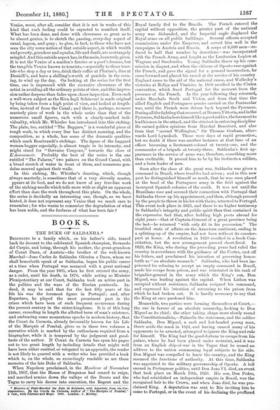ART.
MR. WHISTLER'S "VENICE," AT THE FINE-ART' SOCIETY, NEW BOND STREET.
THERE are artists of many kinds and every rank, and there are painters of many kinds and every rank, who are not artists at all. And hereby "hangs a tale." For it is apt to happen that those who seek to express and those who seek to lead the popu- lar judgment of Art, mistake the good painter for the good artist, and blame as an artist the man who fails as a painter; and so there comes confusion, and sometimes even "gnashing of teeth." It is not sufficiently remembered that artistic ex- cellence must consist at least as much in habit of mind as in habit of hand ; that, like a poet, an artist is "born, not made." And yet, without such remembrance we can hardly estimate rightly the most trivial of our picture exhibitions; and so we fall constantly (we had almost said consistently) into the error of taking good joiner-work for good Art, and bestow our praise on that perfected skill of hand which accomplishes all that it seeks, without hesitation or failure, rather than a work which falls short of its aim, because of that aim's worthiness. We• want no "mute, inglorious Miltons," in these days ; our Miltons must not only be loquacious, but trained in the best graces of elocution, and even then must curtail their epics within the compass of a magazine article, or people will scarcely listen to them. So it is that all hesitating, imperfect utterance of deep thoughts, whether in art or poetry, has gone, for the time at least, "to the wall," and we have substituted as- our chief good, compositions which express in a clear, emphatic,. and partial manner, some thought which no man shall be too hurried, or no woman too shallow, to interpret easily.
This being so, how can we wonder at the present popularity of the art of Etching ?—an art which is essentially limited in its range, emphatic in its diction, and partial in its truth ; which is happier in the gloom of a doorway than in the glow of the sunshine, and turns with a pleasant blindness from whatsoever in Nature or Man is of perfect beauty or noble thought, to linger with a vain kindness over the dark shadows of some city alley, or the broken timbers of a disused barge. It is not, then, won- derful that the series of etchings of Venice by Mr. Whistler, which are now being exhibited at the Fine-Art Society's Gallery in New Bond Street, should give us the desolation, the poverty, and the decay of the great city, rather than recall to us either the times of its greatness or the beauty of its age. The ruin that would be pathetic in a picture, the contrast between former pur- pose and present use, which would almost shock us with its in- tensity if seen in the actual place or in a painted picture, becomes, in the hands of the etcher, but one more element of picturesque- ness, one more reason of the subject's suitability for his purpose. The etching-needle, which could hardly reproduce in all its subtle beauty the unbroken curvature of the perfect palace, finds it both easy and pleasant to touch with jagged outline the shattered arches which are all that time and restoration have left, and, in fact, delights in every accident which, marring the perfect beauty of the sculpture, has brought it into pietun3sque decay. It was hardly, therefore, to be expected that an artist (for, with all his imperfections, Mr. Whistler is a genuine artist) whose work was peculiarly suitable to etching, should have seen more in the old city of the Doges than Mr. Whistler has seen, and set down for us in these twelve illustrations of Venice. And those who feel painfully, as, no doubt, many will, the absence in these works of any feeling for the past glory of
Venice, must, after all, consider that it is not in works of this kind that such feeling could be expected to manifest itself. What has been done, and done with cleverness so great as to be almost genius, is to sketch the passing, every-day aspect of canal, lagoon, and quay ; to give, in fact, to those who have not seen the city some notion of that outside aspect, in which wealth and poverty, grandeur and squalor, life and death, are so strangely mingled. And this outside aspect has, in the main, been truly given. It is not the Venice of a maiden's fancies or a poet's dreams, but the tangible Venice known to tourists,—especially to those tour- ists who stop a day or two, drink their coffee at Florian's, dine at Danielli's, and have a shilling's-worth of gondola in the even- ing, to wind up the day. On looking at the series for the first time, one is impressed with the excessive cleverness of the artist in avoiding all the ordinary points of view, and this impres- sion rather deepens than fades upon closer inspection. Even such a well-worn subject as the Riva degli Schiavoni is made original by being taken from a high point of view, and looked at length- wise, instead of from the Canal ; and there is, perhaps, no more masterly piece of work in the whole series than that of the numerous small figures, each with a clearly-marked indi- viduality, which Mr. Whistler has introduced into this etching. The plate, too, entitled "The Beggars," is a wonderful piece of rough work, in which every line has distinct meaning, and the composition, as a whole, has some of the dramatic qualities which mark Rembrandt's etchings. The figure of the haggard woman-beggar especially, is almost tragic in its intensity, and might stand for " Gervaise Coupeau," towards the close of L' Assommoir. Probably the best of the series is the one entitled "The Palaces," two palaces on the Grand Canal, with a broad stretch of water in front of them, and numerous gon- dolas moored against their walls.
In this etching, Mr. Whistler's drawing, which, though always masterly, is sometimes that of a very slovenly master, ppears at its best, and we do not know of any free-line work -of the etching-needle which tells more with so slight an apparent effort than does the work throughout this plate. On the whole, the series is decidedly an interesting one, though, as we have hinted, it does not represent any Venice that we much care to remember ; for who wants to remember the degradation of what has been noble, and the foulness of what has been fair P







































 Previous page
Previous page